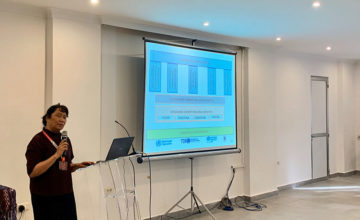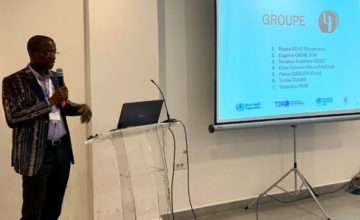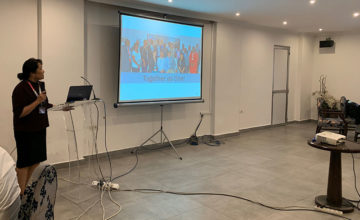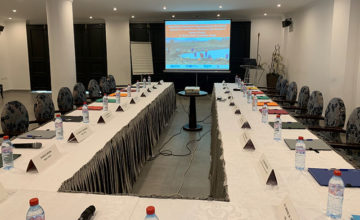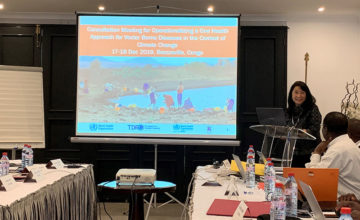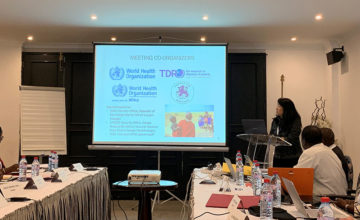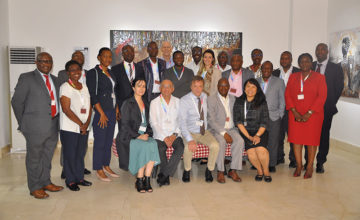Partner event
Consultation meeting for operationalizing a One Health approach to VBDs in the context of climate change
December 17-18, 2019 - Brazzaville (Congo)
Summary
Human health is intimately linked to the state of the environment, including the effects of climate change. At the recent Implementation Research Scientific Working Group meeting (SWG), the expert-members noted the importance of the interrelationship between health and climate and acknowledged that research in this area remains highly topical albeit the completion of the TDR IDRC Research Initiative on Vector Borne Diseases (VBDs) and Climate Change. The SWG further recommended that this work area may be transitioned into a clearly defined future TDR work programme. Thus, this Consultation Meeting is the first step to addressing this recommendation and to explore opportunities for building up a new TDR research initiative the will scale up VBD interventions for increasing resilience to climate change in Africa.
TDR-IDRC Research Initiative on VBDs and Climate Change (2012-2017)
The recently concluded TDR IDRC Research Initiative on VBDs and Climate Change was centred on a particular health threat, VBDs (namely, malaria, Rift Valley fever, African trypanosomiasis and schistosomiasis), in the broader development context of human vulnerability to climate change in Botswana, Cote d’Ivoire, Kenya, Mauritania, South Africa, Tanzania and Zimbabwe. The overall goal of this research initiative was to generate new knowledge and evidence for the development of innovative strategies to reduce VBD-related human vulnerability and to increase resilience of African populations to VBD-related health threats from climate change. It is anticipated that the new knowledge, tools, research capacity, collaboration and policy advice products will be valuable to vulnerable populations in the dryland and Sahelian areas of Africa.
Translation of the new knowledge, evidence and tools from the TDR IDRC Research Initiative into policy and practice, leading to the design of prevention and preparedness response strategies against VBD threats linked to climate change is imperative. It is likewise important to identify and systematize the metrics necessary to assess the public health efficiency and cost effectiveness of the implementation of such intervention for a better understanding of the outcomes and benefits to humans and animal health as well as to ecosystems.
Strategic Action Plan to Scale Up Health and Environment Interventions in Africa (2019-2029)
In a parallel development, WHO Member States in Africa have acknowledged the linkage between health and environment and have committed to promote an integrated approach to addressing priorities and challenges concerning health and the environment. By adopting the 2008 Libreville Declaration, and the 2012 Luanda Commitment, Ministers in both the health and environment sectors have committed to multisectoral joint actions to implement country-specific National Adaption Plans (NAPs) through the Health and Environment Strategic Alliance (HESA) in the respective countries and the establishment of country task teams. This commitment was further confirmed through the recently signed Libreville Strategic Plan of Action to scale up health and environment interventions in Africa for 2019-2029, which is focused on addressing the environmental determinants of human health and ecosystems integrity; and envisioned to contribute to the achievement of the objectives of the 2015 Paris Agreement on Climate Change, the 2016 Marrakesh Ministerial Declaration on Health and Environment and Climate Change and the 2030 United Nations Sustainable Development Goals (SDGs).
The One Health Approach
One of the approaches that has been proven to be valuable in the implementation of joint interventions on health and environment is the One Health (OH) approach, which ensures that human and animal health, and environmental integrity concerns are addressed in an integrated, multisectoral and holistic manner, and to provide a more comprehensive understanding of the problems and potential solutions than would not be possible with siloed approaches by the stakeholders concerned (researchers, public health practitioners, environment, agricultural sectors, communities and other relevant partners). At the same time, the OH approach is quite complex, making its practical implementation and operationalization not straightforward, and thus, the stakeholders concerned will benefit from capacity building on the One Health approach to build resilience against VBDs under climate change conditions.
Objectives and expected outcomes
The principal goal of this Consultation Meeting, therefore, is to identify research gaps and capacity building needs for operationalizing and implementing a One Health approach, embedded into the HESA and the country task teams, to enable African countries to manage the impact of VBDs in the context of climate change. This meeting will also provide the venue to explore opportunities for resource mobilization (both technical and financial) for research using a transdisciplinary OH approach.
It is anticipated that deliverables/products resulting from this Consultation Meeting will inform the framing of a proposed new TDR Expected Result (ER 1.3.13: Operationalizing a One Health approach for VBDs and Climate Change). In addition, it will also form the basis for a new TDR call for research proposals that will facilitate increased integrated coverage of health, agricultural and environment interventions for primary prevention of VBDs while integrating ecosystems preservation in Africa.
General objective
To identify research gaps and capacity building needs for operationalizing and implementing a One Health approach
Specific objectives
- To present a synthesis report on the outcomes and outputs from the TDR IDRC Research Initiative and an analysis of how the research products can be aligned with the implementation of the 2019-2029 strategic plan of action
- To discuss a draft plan that will guide the implementation of the One Health approach. This will include the following:
- Research and capacity building needs, key result areas, deliverables and indicators
- Resources framework
- Metrics-based assessment (including the use of a scorecard) of the One Health approach
Expected outcomes
It is anticipated that at the end of the Research Uptake Meeting, the participants will have:
- Agreed on a list of research and capacity building priority needs for operationalizing a One Health approach for VBDs in the context of climate change
- Provided input to the draft plan for One Health
Program
Day 1 Tuesday, 17 December
Day 2 Wednesday, 18 December
-
9:10 - 10:30
Overview of the Strategic Action Plan to scale up health and environment interventions in Africa 2019-2029
Guy MBAYO
Download presentation
-
14:00 - 16:30
Operationalizing a One Health approach building on the TDR-IDRC research initiative on vector-borne diseases in the context of climate change
Bruce WILCOX & Carsten RICHTER
Download presentation

